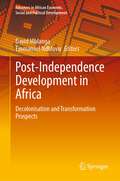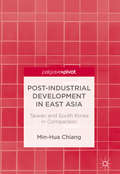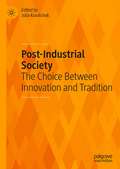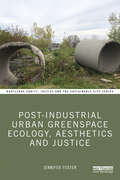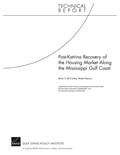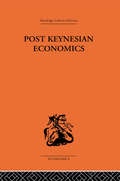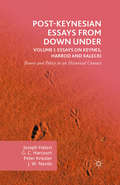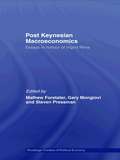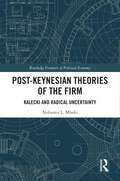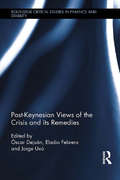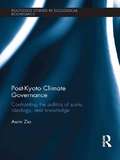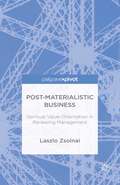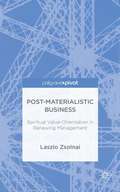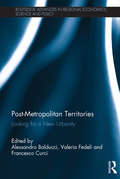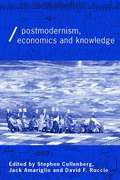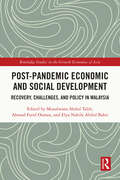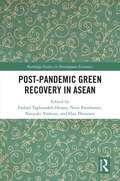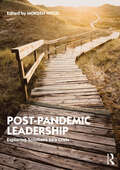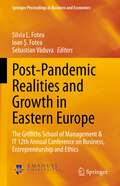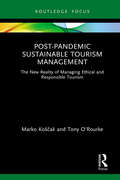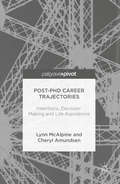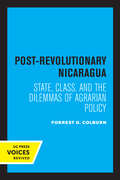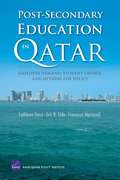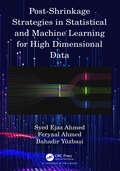- Table View
- List View
Post-Independence Development in Africa: Decolonisation and Transformation Prospects (Advances in African Economic, Social and Political Development)
by David Mhlanga Emmanuel NdhlovuThe book Post-Independence Development in Africa: Decolonisation and Transformation Prospects revisits the development debates and development realities in Africa. This is achieved by offering theoretical comments about post-independence development in Africa and by providing historical details pertaining to the development approaches adopted in Africa immediately after independence in the 1960s and mid-70s. Sitting at the intersection of two sets of scholarly literature, namely; literature on development and literature on development discourses and practices in Africa, the book comprises a mixture of detailed sector-specific accounts of the status of development on the continent. The chapters in the book also contribute to clarifying how the two strands of literature intersect using several case studies across Africa.
Post-Industrial Development in East Asia: Taiwan And South Korea In Comparison
by Min-Hua ChiangThis book purports to investigate and compare the economic development experiences in both Taiwan and South Korea in last two decades. Taiwan and South Korea’s economic development after WWII is a well-known story. However, their development after the successful post-war industrialization has not been comprehensively studied. The book examines whether the three factors —the role of private business, government policy, and foreign influence—that had contributed to Taiwan’s and Korea’s post-war development, are still relevant during the post-industrial development era.Researchers in the fields of global political economy, Asian economic development and East Asian studies will find this book a fresh and invaluable contribution to the literature. The book will also be of value to policy makers in developing countries in drafting their national development policies, diplomats conducting economic diplomacy with Taiwan and South Korea, and business people planning to expand their business interests in Asia.
Post-Industrial Society: The Choice Between Innovation and Tradition
by Julia KovalchukThis book offers a critical and comparative understanding of post-industrial development, highlighting the driving forces and limitations, strategies, sources of funding, tools and technologies for its implementation. It presents the results of research on the formation and functioning of post-industrial development institutions in developed countries and developing countries as integral elements of the national innovation system, and implementation of economic modernization and transformation of business models taking into account contradictions between modern productive forces and getting out of date production relations. This book also explores the widespread impact of new technologies on various areas of modern society, which is often impaired by its conservatism.Comprising contributions from experts across various disciplines including economics, public administration, law, and psychology, this book provides a comprehensive overview of the opportunities and challenges associated with the modern development of society, production, and consumption.It is a book with appeal to scholars and students of economics, business and public administration, interested in post-industrial development in developed and developing countries, and the specifics of implementing strategies for technological improvement in industry and the service sector.
Post-Industrial Urban Greenspace Ecology, Aesthetics and Justice (Routledge Equity, Justice and the Sustainable City series)
by Jennifer FosterThis book offers original theoretical and empirical insight into the social, cultural and ecological politics of rapidly changing urban spaces such as old factories, rail yards, verges, dumps and quarries. These environments are often disregarded once their industrial functions wane, a trend that cities are experiencing through the advance of late capitalism. From a sustainability perspective, there are important lessons to learn about the potential prospects and perils of these disused sites. The combination of shelter, standing water and infrequent human visitation renders such spaces ecologically vibrant, despite residual toxicity and other environmentally undesirable conditions. They are also spaces of social refuge. Three case studies in Milwaukee, Paris and Toronto anchor the book, each of which offers unique analytical insight into the forms, functions and experiences of post-industrial urban greenspaces. Through this research, this book challenges the dominant instinct in Western urban planning to "rediscover" and redevelop these spaces for economic growth rather than ecological resilience and social justice. This book will be of great interest to students and researchers of Urban Planning, Ecological Design, Landscape Architecture, Urban Geography, Environmental Planning, Restoration Ecology, and Aesthetics.
Post-Katrina Recovery of the Housing Market Along the Mississippi Gulf Coast
by Kevin F. Mccarthy Mark HansonIn summer 2006, the Commission on Recovery, Rebuilding, and Renewal asked the RAND Gulf States Policy Institute to describe the state of the pre-Hurricane Katrina housing markets in Mississippi's three coastal counties, to estimate the damage the storm did to their housing markets, to describe the status of the recovery effort, and to identify problems that might inhibit it. This report publishes the findings.
Post-Keynesian Economics (Routledge Library Editions)
by Kenneth K. KuriharaThis volume represents the extension of Keynes' General Theory by a group of eminent economists. Each essay takes Keynes' work as a frame of reference for criticism, explorations and insights, whilst adding to the superstructure on the foundation of the General Theory. The essays also provide the necessary sense of perspective with a view to examining the Keynesian contribution to economic thought and also the limitations of Keynesian economics. The international contributors include:Dudley Dillard, Martin Bronfenbrenner, Mabel F. Timlin, William S. Vickrey, Don Patinkin, Howard R. Bowen, Gerald M. Meier, R.C.O. Matthews, Shinichi Ichimura, Anatol Murad, Lawrence R. Klein, Shigeto Tsuru, Paul P. Streeten, Lorie Tarshis and Franco Modigliani.
Post-Keynesian Essays from Down Under Volume I: Theory and Policy in an Historical Context
by Joseph Halevi Peter Kriesler G. Harcourt John NevileJoseph Halevi, Geoff Harcourt, Peter Kriesler and J. W. Nevile bring together a collection of their most influential papers on post-Keynesian thought. Their work stresses the importance of the underlying institutional framework, of the economy as a historical process and, therefore, of path determinacy. In addition, their essays suggest the ultimate goal of economics is as a tool to inform policy and make the world a better place, with better being defined by an overriding concern with social justice. Volume I analyses the contributions of Keynes, Harrod and Kalecki.
Post-Keynesian Macroeconomics: Essays in Honour of Ingrid Rima (Routledge Frontiers Of Political Economy Ser.)
by Steven Pressman Mathew Forstater Gary MongioviEdited by three very well known academics in the field and contributed to by John Smithin, Laurence Moss and G. C. Harcourt, this volume reflects the breath of the honouree‘s interests and as such it covers a wide range of topics including political economy, labour economics, history of economic thought and macroeconomics.Ingrid Rima, one of the fi
Post-Keynesian Theories of the Firm: Kalecki and Radical Uncertainty (Routledge Frontiers of Political Economy)
by Nobantu L. MbekiWithin Post-Keynesian economics there is a spectrum of approaches to theories of the firm but what they have in common, to their great benefit, is a proper integration of the concept of radical uncertainty: data that cannot be known. This book revisits Kalecki’s theory of the firm is located to show that it constitutes fertile theoretical ground on which to systematically understand the resultant indeterminacy when firms operate under conditions of radical uncertainty. The author proposes a way of generalising radical uncertainty by integrating some of the separate approaches within Post-Keynesian economics centred around Kalecki’s work. Through this, it is shown that radical uncertainty does more than just change the ultimate motivation of firms (dropping short-run profit maximisation; more complex motivation; interconnectivity with the environment), it is central to the emergence, existence and motivation of firms, and critically also firm strategy. It is argued that firms do not simply respond to uncertainty: it is the systematic cause of their intentional behaviour. Through developing these arguments, the book also contributes to the methodology of Kalecki and Shackle, as well as Kaleckian price theory. This book will be important reading for anyone interested in theories of the firm, Post-Keynesian economics and heterodox approaches to economics more broadly.
Post-Keynesian Views of the Crisis and its Remedies (Routledge Critical Studies in Finance and Stability)
by Óscar Dejuán Eladio Febrero Jorge UxóAt the end of the 20th century, mainstream economics was based on theories which viewed capitalism as a self-regulating system, whereby crises come about due to external shocks and would be automatically corrected by the price mechanism if it was flexible enough. Post-Keynesian economists, however, consider that the business cycle and the crises are endogenously generated. They recommend active policies as a response, though the remedies may be worse than the illness if they are not applied at the right moment and in the right proportions. The first great recession of the 21st century offers post-Keynesian economists an opportunity to prove the realism of their models. It is also a chance to make theoretical improvements, to abandon some hypotheses and to introduce new ones. This book, from a top group of international economists, analyzes the causes, consequences and evolution of the crisis from a variety of post-Keynesian perspectives. It then presents a case for realistic and essential remedies. The book is both theoretical and applied, with a global reach and a particular focus on the European debt crisis.
Post-Kyoto Climate Governance: Confronting the Politics of Scale, Ideology and Knowledge (Routledge Studies in Ecological Economics #27)
by Asim ZiaIn the midst of human-induced global climate change, powerful industrialized nations and rapidly industrializing nations are still heavily dependent on fossil fuels. Even if we arrive at a Hubbert’s peak for oil extraction in the 21st century, the availability of technologically recoverable coal and natural gas will mean that fossil fuels continue to be burned for many years to come, and our civilization will have to deal with the consequences far into the future. Climate change will not discriminate between rich and poor nations, and yet the UN-driven process of negotiating a global climate governance regime has hit serious roadblocks. This book takes a trans-disciplinary perspective to identify the causes of failure in developing an international climate policy regime and lays out a roadmap for developing a post-Kyoto (post-2012) climate governance regime in the light of lessons learned from the Kyoto phase. Three critical policy analytical lenses are used to evaluate the inherent complexity of designing post-Kyoto climate policy: the politics of scale; the politics of ideology; and the politics of knowledge. The politics of scale lens focuses on the theme of temporal and spatial discounting observed in human societies and how it impacts the allocation of environmental commons and natural resources across space and time. The politics of ideology lens focuses on the themes of risk and uncertainty perception in complex, pluralistic human societies. The politics of knowledge lens focuses on the themes of knowledge and power dynamics in terms of governance and policy designs, such as marketization of climate governance observed in the Kyoto institutional regime.
Post-Materialist Business: Spiritual Value-Orientation in Renewing Management
by László ZsolnaiPost-Materialist Business presents a spiritual-based approach to business and management. It uses pluralistic view of spirituality and provides a number of inspiring cases of alternative organizations which go beyond the materialistic mindset of business and serve the common good of society, nature, and future generations.
Post-Materialistic Business: Spiritual Value-Orientation in Renewing Management
by Laszlo ZsolnaiPost-Materialistic Business
Post-Metropolitan Territories: Looking for a New Urbanity (Routledge Advances in Regional Economics, Science and Policy)
by Alessandro Balducci Valeria Fedeli Francesco CurciProcesses of multi-scalar regional urbanization are occurring worldwide. Such processes are clearly distinguishable from those of the nineteenth and twentieth centuries due to the shifting concepts of both the city and the metropolis. International literature highlights how what we have historically associated with the idea of cities has long been subjected to consistent reconfiguration, which involves stressing some of the typical features of the idea of "cityness". Post-Metropolitan Territories: Looking for a New Urbanity is the product of a research project funded by the Italian Ministry for Education, Universities and Research (MIUR). It constitutes a thorough overview of a country that is one of Europe's most diverse in terms of regional development and performance: Italy. This book brings together case studies of a number of Italian cities and their hinterlands and looks at new forms of urbanization, exploring themes of sustainability, industrialization, de-industrialization, governance, city planning and quality of life. This volume will be of great interest to academics and students who study regional development, economic geography and urban studies, as well as civil servants and policymakers in the field of spatial planning, urban policy, territorial policies and governance.
Post-Modernism, Economics and Knowledge
by Stephen Cullenberg David F. Ruccio Jack AmariglioOnly in the past twenty years have debates surrounding modernism and postmodernism begun to have an impact on economics. This new way of thinking rejects claims that science and mathematics provide the only models for the structure of economic knowledge.This ground-breaking volume brings together the essays of top theorists including Arjo Klamer, D
Post-Pandemic Economic and Social Development: Recovery, Challenges, and Policy in Malaysia (Routledge Studies in the Growth Economies of Asia)
by Muzalwana Abdul Talib Ahmad Farid Osman Bahri, Elya Nabila AbdulThis book explores Malaysia’s experience during the COVID-19 pandemic, analyzing the profound economic and societal challenges faced from 2020 to 2022.The coverage of Malaysia’s post-pandemic recovery provides valuable insights into ongoing global issues. Contributors to this book address a wide range of topics, including unemployment, monetary and trade policies, tourism, human capital development, and women’s labor participation. They also examine the rise of the gig economy, poverty alleviation efforts, and social safety nets. By presenting model applications and empirical research, the book offers data-driven policy advice to handle challenges that arise from pandemics, such as rising inflation, supply chain disruptions, disparities and sustainability issues.This book will interest academics and researchers in the field of econometrics, Asian economics and Malaysian studies. It will also act as a useful guide for NGOs, practitioners, public administrators, and economic policymakers involved in post-COVID-19 economic revival and policy development.
Post-Pandemic Green Recovery in ASEAN (Routledge Studies in Development Economics)
by Naoyuki Yoshino Farhad Taghizadeh-Hesary Nisit Panthamit Han PhouminASEAN’s real gross domestic product (GDP) had declined sharply due to the COVID-19 pandemic. The economic downturn and the uncertainty about the future reduced the new investments in green projects drastically. Besides this, many governments rolled back environmental regulations and taxes and increased fossil-fuel intensive infrastructure and electricity to stimulate economic growth. Post-Pandemic Green Recovery in ASEAN consists of several empirical studies using fresh data, with regional and country-level perspectives on ways to keep the greenness of the economic recovery plans. The chapters look at various aspects and sectors, including tourism, infrastructure, energy, small and medium enterprises (SMEs), employment, and livelihood, by assessing the effectiveness of various tools and instruments, including green finance, carbon taxation, green Sukuk, credit guarantee, cash transfer payment, power purchase agreements, and the related policies. They also provide practical policy recommendations useful for the ASEAN member states and other developing regions for the green recovery in the post-pandemic. Reiterating the importance of green and low-carbon mechanisms and climate change tackling policies besides the usual economic recovery strategies, this book is a precious resource for the researchers of economics, finance, ASEAN and Asian studies, and policymakers.
Post-Pandemic Leadership: Exploring Solutions to a Crisis
by Morgen WitzelThis book shows readers how to rethink and reimagine leadership and charts a course towards a new vision of leadership. It outlines lessons to be learned for leadership – not only after the COVID pandemic but also in light of other ongoing crises around issues such as climate change and global inequality. The pandemic has shone a harsh spotlight not just on the leaders of organisations but on the concept of leadership itself and the way we lead. Many of those who were in positions of power before the crisis have been found wanting; too often, our idols have turned out to have feet of clay. But does the problem lie with the leaders themselves, or do the roots of the problem lie deeper? Do we need to start rethinking and reimagining the kind of leadership we will need in a post-COVID world? Post-Pandemic Leadership brings voices from every sector to demonstrate what changes we can make in order to make leadership fit for purpose in the twenty-first century. Illustrating a need for a radical change in leadership, with leaders focusing much more on human relationships, kindness, fairness, well-being and a general sense of responsibility, this book will be of interest to both established leaders and the next generation of leaders in education and in practice.
Post-Pandemic Realities and Growth in Eastern Europe: The Griffiths School of Management & IT 12th Annual Conference on Business, Entrepreneurship and Ethics (Springer Proceedings in Business and Economics)
by Sebastian Văduva Ioan Ş. Fotea Silvia L. FoteaAs the COVID-19 crisis comes to an end, leaders, organizations, and governments have to develop a “new normal” for doing business with a focus on protecting the environment, integrating new technologies and adapting to new social changes. Based on empirical studies and conceptual contributions from researchers and practitioners presented at the Griffiths School of Management & IT’s 12th Annual Conference on Business, Entrepreneurship and Ethics (GSMAC), this proceedings volume provides a multifaceted perspective on the impact and effects of the COVID-19 pandemic on various public and private systems including education, business organizations and consumer behavior. In particular, this book explores the impact of the pandemic on remote work and employee health, sustainable development, and economic growth, among others. It also highlights the role of data analysis in understanding trends, opportunities, and challenges in the above systems.
Post-Pandemic Sustainable Tourism Management: The New Reality of Managing Ethical and Responsible Tourism (Routledge Focus on Environment and Sustainability)
by Tony O’Rourke Marko KoščakTourism, as with many parts of the economy, is at a pause-reflect-rest stage in the post pandemic world. This book puts forward some positive and practical concepts for the reset stage in terms of pushing towards wholly sustainable tourism. The COVID-19 pandemic has been disastrous in terms of the loss of human life, the physical and mental strains placed on large numbers of populations across the globe who have been quarantined in their homes and in terms of the costs of dealing with the pandemic and supporting business and citizens through the period. Tourism has been comprehensively damaged, not only in advanced economies, but also in poorer developing economies where tourism provides a vital source of income and employment. The problem has been complicated by the shattering effect on mass tourism, which has been far more sensitive to the shutdown of travel and accommodation than ethical and responsible tourism activities focused at a local sustainable level. Therefore this book evaluates how the pandemic and economic decline affects ethical and responsible tourism - the type of tourism which sustains and develops local communities in a balanced way for the benefit of future generations. It reflects on the position the authors established in "Ethical & Responsible Tourism - managing sustainability in local tourism destinations" and then determines how ethically and responsibly focused tourism may adapt, develop and maintain safety for consumers in the post-virus world. This book will be essential reading for students, researchers and practitioners of tourism, environmental and sustainability studies.
Post-Petroleum Design
by George ElvinDespite the growing demand for design strategies to reduce our petroleum use, no one has yet brought together the lessons of the world’s leading post-petroleum designers into a single resource. Post-Petroleum Design brings them together for the first time. Readers will be introduced to the most current, innovative, plastic-and petroleum-free products and projects in industrial design, architecture, transportation, electronics, apparel and more. Post-Petroleum Design explores firsthand the client and consumer motivations behind the demand, and shares the case studies, principles, best practices, risks and opportunities of the world’s leading post-petroleum design experts who are already meeting that demand. It introduces 40 inspiring individuals from across the globe; people like Eben Bayer, the American innovator whose company, Ecovative, is growing houses from mushrooms; Mohammed Bah Abba, whose Zeer Pot is helping families keep produce fresh in the sweltering Nigerian summer without electricity; and the engineers at Mercedes-Benz Advanced Design Studios whose Biome car evolves from genetically engineered DNA. Post-Petroleum Design gives design professionals the information they need to research, evaluate, and select materials, technologies and design strategies that meet the growing demand for sustainable design, plastic-free materials and process energy conservation. Designer profiles, studies, statistics and many colour illustrations all highlight the work—some of the best design work to be found anywhere, and showcased here for the first time.
Post-PhD Career Trajectories
by Lynn Mcalpine Cheryl AmundsenThis book argues that post-PhD career planning should ideally begin at the same time as the PhD itself. Drawing from ten years of research and stories of close to 50 individuals, each chapter focuses on the stories of individuals who share common career intentions and how they negotiate these both before, during and after their studies. Each career trajectory is different as individuals planned and made decisions in the face of both expected and unexpected work, personal experiences and responsibilities. The book concludes with resources to help those who are currently planning or reflecting on their own career trajectories.
Post-Revolutionary Nicaragua: State, Class, and the Dilemmas of Agrarian Policy (California Series on Social Choice and Political Economy)
by Forrest D. ColburnThis title is part of UC Press's Voices Revived program, which commemorates University of California Press’s mission to seek out and cultivate the brightest minds and give them voice, reach, and impact. Drawing on a backlist dating to 1893, Voices Revived makes high-quality, peer-reviewed scholarship accessible once again using print-on-demand technology. This title was originally published in 1986.
Post-Secondary Education in Qatar: Employer Demand, Student Choice, and Options for Policy
by Louay Constant Charles A. Goldman Cathleen Stasz Eric R. Eide Paco MartorellThe government of Qatar has made significant investments in post-secondary education to ensure that Qataris are able to contribute to the country's social and economic goals. The authors describe RAND's analysis of occupational demand and related post-secondary educational opportunities, and offer recommendations for improving the country's current provision of post-secondary education.
Post-Shrinkage Strategies in Statistical and Machine Learning for High Dimensional Data
by Syed Ejaz Ahmed Feryaal Ahmed Bahadir YüzbaşıThis book presents some post-estimation and predictions strategies for the host of useful statistical models with applications in data science. It combines statistical learning and machine learning techniques in a unique and optimal way. It is well-known that machine learning methods are subject to many issues relating to bias, and consequently the mean squared error and prediction error may explode. For this reason, we suggest shrinkage strategies to control the bias by combining a submodel selected by a penalized method with a model with many features. Further, the suggested shrinkage methodology can be successfully implemented for high dimensional data analysis. Many researchers in statistics and medical sciences work with big data. They need to analyse this data through statistical modelling. Estimating the model parameters accurately is an important part of the data analysis. This book may be a repository for developing improve estimation strategies for statisticians. This book will help researchers and practitioners for their teaching and advanced research, and is an excellent textbook for advanced undergraduate and graduate courses involving shrinkage, statistical, and machine learning. The book succinctly reveals the bias inherited in machine learning method and successfully provides tools, tricks and tips to deal with the bias issue. Expertly sheds light on the fundamental reasoning for model selection and post estimation using shrinkage and related strategies. This presentation is fundamental, because shrinkage and other methods appropriate for model selection and estimation problems and there is a growing interest in this area to fill the gap between competitive strategies. Application of these strategies to real life data set from many walks of life. Analytical results are fully corroborated by numerical work and numerous worked examples are included in each chapter with numerous graphs for data visualization. The presentation and style of the book clearly makes it accessible to a broad audience. It offers rich, concise expositions of each strategy and clearly describes how to use each estimation strategy for the problem at hand. This book emphasizes that statistics/statisticians can play a dominant role in solving Big Data problems, and will put them on the precipice of scientific discovery. The book contributes novel methodologies for HDDA and will open a door for continued research in this hot area. The practical impact of the proposed work stems from wide applications. The developed computational packages will aid in analyzing a broad range of applications in many walks of life.
